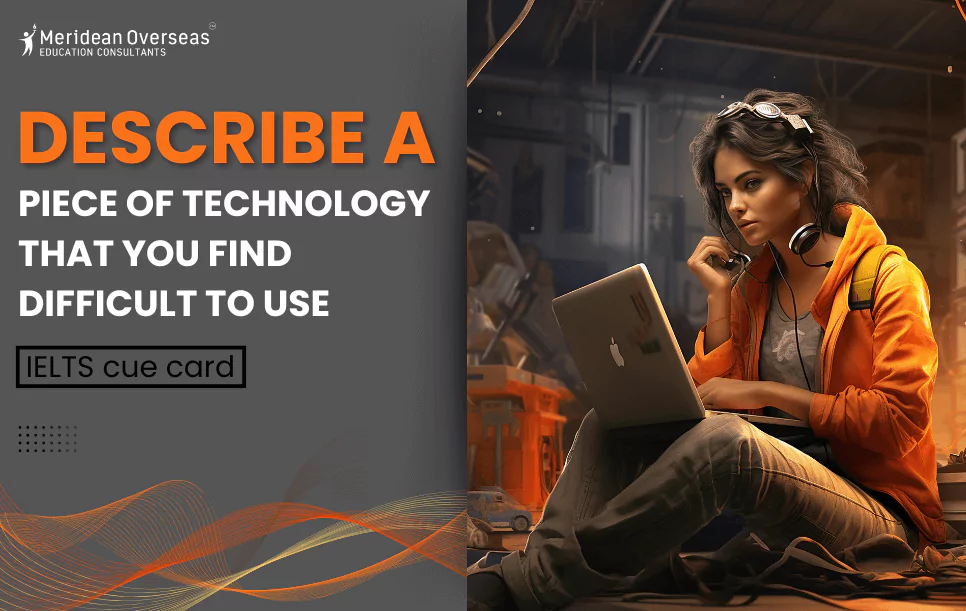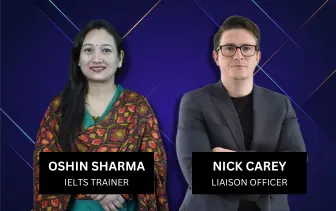
Announcements

Announcements

Meridean Overseas
Updated On 03 May 2024 & Read Time 8 minutes
6.4k
If you're eager to enhance your IELTS speaking skills, you've come to the right place. In this blog, we will discuss, “Describe a piece of technology that you find difficult to use”, which delves into the intricacy of today’s technologies and their influence.
The sample answers below are designed to assist you in responding to the examiner's question, offering a valuable guide for your preparation. Additionally, a follow-up section focused on a discussion of the subject on your cue card will be included in the third speaking part of the IELTS exam.
Table of Contents
Technology has impacted almost every sphere of human life, changing us socially, emotionally and physically. Here, I will discuss the technology I need help using.

A couple of years ago, I bought some home appliances. As I purchased many appliances at a high cost, they gave us a microwave oven free of cost.
The day I got a microwave, I didn’t even know how to use it because it was my first time. Then, I researched how to use a microwave in different modes.
As I learned how to use it initially, I tried many things to bake, but sometimes I succeeded, and other times I failed. But now, since I have got an idea of how to use it effectively, I bake cakes for my family on birthdays or when I get bored and try new recipes.
This product was excellent because after I got it, I tried my favourite recipes, which tasted better than those I tried in outside shops. Early on, I hesitated to eat all the food I bought from outside, but now I prepare all that food at home with this oven.
Technologies in education, medicine and home furnishings have advanced quickly, improving our comfort and ease. Our lives have undoubtedly been more comfortable and easy because of the rapid advancements in housing, healthcare and education, but our reliance on technology has become dangerously high.
Get free IELTS Sample Papers to learn the type of questions asked in the IELTS (Speaking, writing, reading, and listening) section.
Get Your Free GuideTechnology has become so rooted in our daily lives that it is hard to imagine living without it. Unique boxes from science fiction are different from 3D printers. Instead, they operate more or less like traditional 2D inkjet printers, producing the needed object by layering.
I understood it while in school and working on a project that required 3D printers. The range of materials that 3D printers can produce is rather broad. For example, they may print stiff goods like eyewear using plastics and flexible items like bike handlebars or phone cases using a combination of hybrid rubber and plastic powder.
3D printers can print with carbon fibre and metallic powders for incredibly robust industrial items. Hoence, I bought it so I could complete my project swiftly and efficiently.
I do use it quite often for my projects but I still need assistance. Actually, I was mistaken when I initially believed it would be simple. It took me about an hour longer to complete the assignment because I had to involve my brother in it after realising it was tricky to use. 3-D technology may be complicated for those like me who need to become more familiar with it. I know how to use it, but sometimes I need my brother's assistance.
I am slightly disappointed with my digital camera experience. Although its advanced features and capabilities impress me, the complicated user interface and a lack of easy-to-use controls frustrate me. Despite my efforts to familiarise myself with its operations, I still need to work on using it effectively.
Also, read: Describe someone you know who has recently moved to a new place
Technology has made people’s lives easier and more luxurious. People and industries gradually began to rely on technology to get things done because it was faster and easier.
Embark and excel in your study abroad journey with our expert team!

Before your test, start using English in conversations with friends, family and classmates. You can videotape yourself to gauge your confidence and whether you need to work on your pronunciation.
Feel free to provide correct or incorrect answers in your test. Recall that the examiner will evaluate your ability to convey yourself clearly in English while expressing opinions.
You shouldn't worry about the Speaking exam. The examiner is not marking your answers but grading your ability to articulate your ideas clearly and concisely.
Repeating the examiner's question in your response is not appropriate. Recognise the question and restate it in your terms.
Don't change the speed at which you speak. Act normal, just as you would converse with others in daily life. Rapid speech might lead to pronunciation errors.
In your responses, make sure to always utilise the appropriate verb tenses. Don't respond in the past tense, for example, if someone asks you what kind of music you enjoy (present tense).
Also, read: Describe a place where there was a lot of noise - IELTS cue card
Question: Are training programs or resources available to help users better understand and navigate this technology?
Answer: Yes, there are training programs and resources to help the users. Many manufacturers offer online training, user manuals and video tutorials that provide step-by-step instructions for effectively applying this technology. Users can often ask for help from other users and experts on various forums and online support communities.
Question: How could the design or user interface of the technology be improved to make it more user-friendly?
Answer: Prioritising user feedback and iterative testing throughout the development process are the ways to improve the technology's design or user experience. Developers can ensure that the interface meets the expectations of their intended audience by seeking input from a wide range of users and incorporating their opinions and suggestions into its design.
Question: Can you describe any specific features or functions of the technology that you find particularly challenging?
Answer: The user interface is a feature of this technology that I find especially hard to use. Despite several attempts at navigating its menus and settings, I often need the variety of options and controls available. The design of the interface may be challenging to understand and not intuitive, which makes it hard to find particular functions or opportunities for accessing some features.
Also, read: Describe a new store/shop that has recently opened in your town/city
Question: Are your difficulties with this technology standard among other users, or are they specific to your experience?
Answer: Although I can't speak for all users, many people may have similar problems with this technology, particularly if they share the same usage patterns and preferences. The challenges I've faced with navigating the user interface and troubleshooting compatibility issues, for example, are likely to resonate with others who have encountered similar hurdles in their interactions with the technology.
Boost your IELTS score with effective practice using these sample papers.
Get Your Free Guide
The speaking component has the same weight as the others, even with a 11 to 15-minute time limit. As such, you will need to practise a lot to handle this area. This section has open-ended questions, so the examiner may ask you a couple more after you respond to one. Utilise your time wisely and answer suitably and confidently.
We hope you know how to respond to cue card questions in your IELTS speaking test. But, if you would like to prepare for IELTS, you can contact our expert counsellors at Meridean Overseas Education Consultants (MOEC). You can also take free online counselling through our website. Our expert counsellors will provide you with the best support and guidance you need for admission and visa. In addition, they will help you shortlist the universities according to your profile. For more information or any queries, contact application02@meridean.org or 1800-1230-00011.

Contact MOEC Experts for Study Abroad Guidance!
By using our site, you agree to our use of cookies.

Hurry up before admissions close.

Contact MOEC Experts for Study Abroad Guidance!
